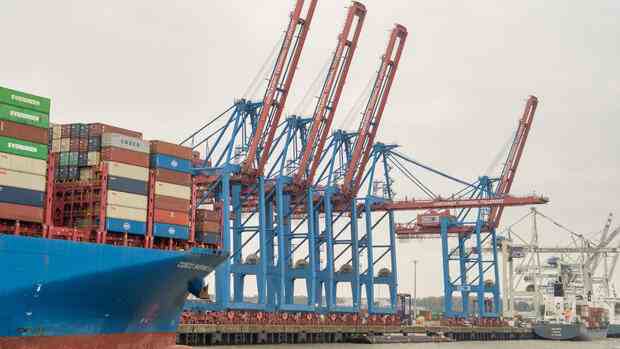Berlin Despite the crisis, the German economy grew by 1.9 percent in real terms last year. This was announced by the Federal Statistical Office on Friday in Berlin. The strong upswing expected before the Russian war of aggression against Ukraine did not materialize. In January 2022, for example, the federal government still expected growth in gross domestic product (GDP) of 3.6 percent.
However, as a result of the war and the ongoing energy crisis, initial forecasts for 2022 looked even bleaker. In October, the federal government’s outlook was 1.4 percent for the past year. In 2022, however, Germany exceeded the pre-crisis level for the first time since the Corona period: Compared to 2019, GDP was 0.7 percent higher.
Ruth Brand, President of the Federal Statistical Office, said: “Despite the energy crisis and massively rising prices as a result of the war in Ukraine, material and delivery bottlenecks and the ongoing corona pandemic, the German economy held up well in 2022.”
Federal Economics Minister Robert Habeck (Greens) also said: “According to the data we currently have, the economic slowdown over the winter half-year will be milder and shorter than expected.”
Top jobs of the day
Find the best jobs now and
be notified by email.
According to the Wiesbaden statisticians, the German economy grew in the first three quarters. For the fourth quarter, the authority is assuming stagnation. However, this is “afflicted with a high degree of uncertainty” because not all the data for this period is available, explained Brand.
Private consumption supports growth
The situation in the Ukraine primarily affected the German economy through energy prices. Germany imports a large part of its gas and coal requirements from abroad.
Due to the sharp rise in the price of imported energy, a great deal of wealth has flowed out of the Federal Republic. The Munich Ifo Institute estimates this outflow at around 64 billion euros for 2022 alone, which is 1.8 percent of economic output.
The fact that the German economy still grew by 1.9 percent at the end of the year is mainly due to its resilience to the crisis. Despite the suspension of Russian gas deliveries, industrial production has not collapsed as much as feared in some places, especially because there has been no gas shortage. Overall, value added in industry grew slightly by 0.2 percent in 2022.
In addition, private consumption proved to be a growth driver, rising by 4.6 percent. This was mainly due to the withdrawal of the corona restrictions. There have been many more visits to restaurants, people have traveled again, explained Michael Kuhn from the Federal Office: “People really spent their money there.” The massive slump in consumption that some feared as a result of high energy prices has also materialised not shown at least in 2022.
The story of the significantly weaker, but not massive collapse of the economy in Germany should also continue in the coming months. After some forecasters had already feared significant slumps in the economy in the course of the current winter, because the high energy prices are only now having an impact on many households and companies, the outlook no longer looks so bad.
The economy in Germany has grown again.
(Photo: mauritius images / Manfred Bail / imageBROKER)
Most institutes continue to expect a decline in GDP for 2023 as a whole, but only by a few tenths of a percentage point. The investment bank Goldman Sachs is now forecasting slight growth again for the EU.
“In the current year, the economy is facing a further slowdown, in particular private consumption will be weak in view of the massive loss of purchasing power,” said Stefan Kooths, head of economics at the Kiel Institute for the World Economy. However, a slight revival is to be expected in the second half of the year.
recession risk decreases
This is also confirmed by an analysis published on Thursday by the institute for macroeconomics and business cycle research (IMK), which is close to the trade unions. For the current first quarter from January to the end of March, the risk of a recession, i.e. a contraction of the economy, has fallen to 29 percent. At the beginning of December, the probability for the following three months was still 52.5 percent.
“The state and the social partners have effectively managed to stabilize the economy with extensive measures,” said IMK economics expert Thomas Theobald, with a view to the electricity and gas price brakes and the agreed wage increases for millions of employees. In addition, the energy prices, which are currently falling again, should contribute to relaxation.
In 2022, the German state budget slipped into the red for the third year in a row. The federal, state, local and social security expenditures exceeded revenue by 101.6 billion euros, as the Federal Statistical Office announced in an initial estimate.
This corresponds to a deficit of 2.6 percent of GDP. It is therefore lower than in the two previous years, which were characterized by high costs as a result of the corona crisis: the deficit was 3.7 percent in 2021 and 4.3 percent in 2020.
More: US star economist on the global economy: “We are experiencing the mother of all debt crises.”
